Iran Expels Over 24,000 Illegal Afghans
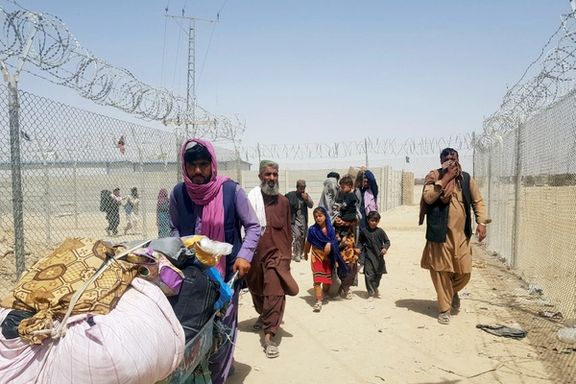
Over 24,000 illegal Afghans have been expelled from Iran by border guards amid rising calls to prioritize the needs of Iranian citizens amid the economic crisis.

Over 24,000 illegal Afghans have been expelled from Iran by border guards amid rising calls to prioritize the needs of Iranian citizens amid the economic crisis.
The Commander of the Border Guards in Khorasan Razavi province, Majid Shojai, stated on Monday that “within the past 10 days, the individuals, present in the country illegally, were identified and handed over to the Afghan government's representative at the zero point of the Dogharoun region.”
Khorasan Razavi province, sharing a 531-kilometer border with Turkmenistan to the north and northeast and a 302-kilometer border with Afghanistan to the east, has been a focal point for border control.
Simultaneously, a member of parliament, Abolfazl Aboutorabi, proposed measures to penalize those renting houses or providing employment to “unauthorized foreign nationals”. According to Aboutorabi, both Iranian landlords and employers who engage unauthorized foreign nationals will face legal consequences.
Critics claim that amidst the country's economic crisis, focus should be on supporting Iranian citizens before refugees and immigrants.
Hassan Ramazani, another parliamentarian, recently claimed, based on statements from Iran's Minister of Labor, that approximately five million jobs are currently held by foreign nationals, particularly Afghan residents in Iran. The assertion comes at a time when official statistics from the Statistical Center of Iran indicate the loss of nearly 900,000 jobs in the country since 2018.
Accusations of Afghan refugees contributing to unemployment in Iran coincide with reports of significant foreign investments by Afghan migrants and traders. The Iranian Foreign Investment Association's statistics reveal that in the first half of this year alone, the country attracted $2 billion in foreign investments, with Afghan migrants ranking first in terms of the number of investments.

The Instagram accounts of Iranian actress Maryam Masoumi and Setareh Masoumi, the wife of football player Mehdi Ghayedi, have been blocked due to the publication of photos without hijab.
Maryam Masoumi's account, boasting one million and 300 thousand followers, and Setareh Masoumi's account, with 578 thousand followers, were both affected by the suspension.
On Maryam Masoumi's page, a photo with a caption said, "This page has been suspended on the order of the judicial authorities by the Public Security Police."
Similarly, a photo on Setareh Masoumi's page conveyed that the page was blocked "according to the order of the judicial authorities, due to the publication of criminal content."
The blocking occurred while Mehdi Ghayedi and his spouse are currently residing in Dubai. The key issue revolves around how these accounts were blocked without gaining access to Instagram's internal system. While the exact details remain uncertain, the most plausible scenario is that the account owners were requested to provide their passwords, following which the accounts were blocked.
In response to the incident, Fars News Agency, affiliated with the Revolutionary Guards, reported on Monday that the reason for Maryam Masoumi's page suspension was attributed to "the young actress's use of images with inappropriate clothing."
The development is part of a broader trend where many Iranian women, including notable figures, consistently share photos without mandatory hijab on social networks.
The police, particularly after the Woman, Life, Freedom protests have taken measures to curtail the activities of individuals who defy mandatory hijab, leading to detentions in some cases.

Prices for essential food items continued to grow in Iran last month, with red meat registering an 82-percent jump compared to the same month one year ago.
The galloping inflation report published by the Statistical Center of Iran (SCI), a government outfit, comes after warnings last week that a $14 billion government outlay for importing food and medicine next year will be insufficient to address needs.
In Iran’s closed economic system importers have no direct access to foreign currencies and can only receive US dollars or euros from the government. Local media have pointed out that $14 billion proposed in next year’s budget for food and medicine would only be enough for importing essential food such as grains and protein sources but cannot also pay for medicine.
According to the SCI report, other food items also experienced serious inflation. Prices of fish increased by 72 percent compared with prices in October-November 2022. Overall, the point-to-point inflation rate for a basket of essential daily needs was almost 40 percent.
Other recent reports have put the inflation rate at more than 50 percent. Also, overall inflation for retail food prices was reported to be 37 percent.
Despite higher oil exports this year, the Iranian government seems unable to lower inflation and its restrictive foreign currency policies continue. The national currency rial, still hovers around its all-time low of 500,000 per US dollar, a 12-fold fall in value since early 2018 when the United States withdrew from the JCPOA nuclear deal and imposed economic sanctions on Iran.
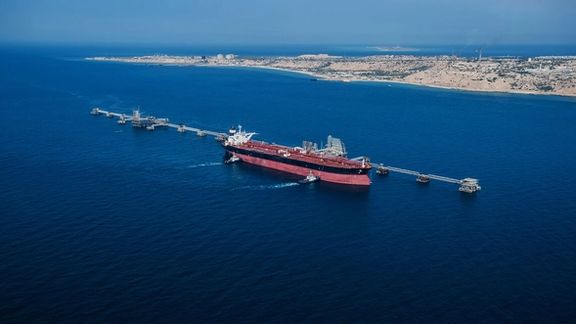
The exact amount of oil revenues is a state secret, but it is believed Iran is selling Cina around 1.1 million barrels of oil per day, with large discounts. Experts estimate that with the discount, and additional costs related to the illicit shipments of oil, Iran is probably receiving around $50 per barrel, which would mean $21 billion of income per year, hardly enough to finance the food imports and other needs. Other Iranian oil shipments to Venezuela or Syria hardly return any hard currency to Tehran’s coffers.
This is why next year’s draft budget bill presented to parliament has increased taxes to deal with persistent deficits.
The government has projected a 50-percent increase in taxes of various kind compared to the current budget. Total expected tax revenues will reach over 11,220 billion rials ($22.44 billion), Jahan-e-Sanat said. This would be equal or greater than the annual oil income.
The total government budget will reach 24,620 billion rials ($49.2 billion) next year, which shows an increase of 18.2 percent compared to this year’s budget, the report added. That is to say, the tax revenues will account for more than 45 percent of the Iranian government’s operating budget.
The inflation rate in Iran has stayed at or above 40 percent for at least three years, increasing political instability. After last year’s anti-government unrest, more economic protests are taking pace in recent weeks. Workers in different sectors and retires of state enterprises stage daily protests demanding higher pay, as millions of previously middle-class people are now considered poor. Next years budget, forecasts a 16-percent pay increase for workers, less than half of the current rate of inflation.
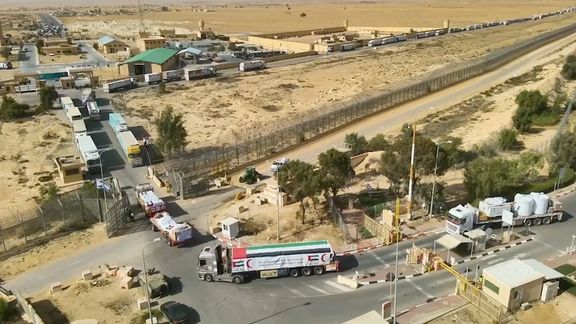
As the temporary ceasefire between Israel and Hamas enters its final day, the militant group is actively seeking an extension.
The ceasefire, initiated on Friday, has resulted in the release of dozens of hostages, with over 100 Palestinian prisoners held on terror charges freed by Israel as part of the agreement.
Hamas is pushing for an extended truce, to give the group time to regroup amidst the devastation inflicted by Israel's relentless retaliation for its massacre of October 7. The designated terror group killed 1,200 mostly civilians and took 240 or more hostage in Gaza.
However, in spite of the fact that over 14,000 Gazans have been killed, including top Hamas commanders, and half of the strip now turned to rubble, Ali Fadavi, the deputy commander of the Islamic Revolutionary Guard Corps (IRGC), asserted on Monday that the Israeli military's perceived invincibility has diminished.
"The invincible image that Israelis had portrayed for military dominance collapsed," he said. "Several hundred individuals breached its seemingly impregnable walls, penetrating tens of kilometers into occupied Palestine."
Israeli Prime Minister Benjamin Netanyahu, addressing his forces in Gaza, conveyed a resolute stance on Sunday, stating that once hostages are released, "Nothing will stop us." He said while the hostage release continues, he would agree to one additional day for every 10 captives released but vowed to continue the war until Hamas is eradicated from the strip.
While Iran takes credit for supporting Hamas financially and militarily over the past two decades, it has refrained from direct military involvement in the current conflict. Instead, its proxies have taken the front line. Even amidst the ceasefire, Lebanese Hezbollah has continued its aggression on Israel's northern border and Yemen's Houthis have taken further actions on vessels in the Red Sea.
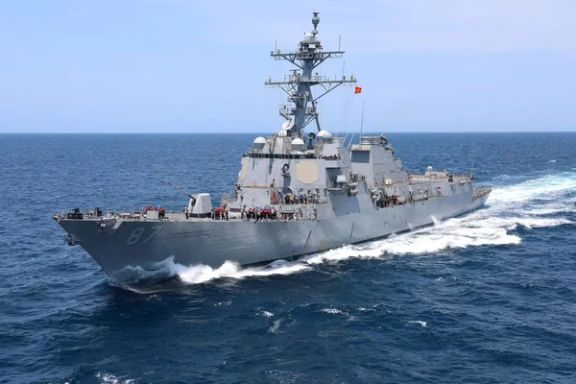
Amid the backdrop of the Gaza war, Iranian proxy the Houthis, has stepped up activities in the Red Sea, including strikes on a US vessel.
It has drawn the US into yet another potential conflict in the region as a US Navy warship responded to a distress call from a commercial tanker in the Gulf of Aden that had been seized by the militia.
The Houthis subsequently fired missiles at the USS Mason, which had come to the aid of the hijacked cargo tanker, identified as the Central Park.
US Central Command first released a statement on Sunday claiming that “coalition elements demanded release of the vessel” after coming to its aid. “Subsequently, five armed individuals debarked the ship and attempted to flee via their small boat. The Mason pursued the attackers resulting in their eventual surrender. The crew of the M/V Central Park is currently safe,” it said.
However, in the early hours of Monday morning local time, it said “two ballistic missiles were fired from Houthi controlled areas in Yemen toward the general location of the USS Mason Ason (DDG 87) and M/V Central Park. The missiles landed in the Gulf of Aden approximately ten nautical miles from the ships”.
It came as the troops were concluding the response to the M/V Central Park distress call. “There was no damage or reported injuries from either vessel during this incident”, it confirmed, though raising alarms as to what will be next from the Yemeni militia group.
The Southern Transitional Council in Yemen, which has been fighting the group designated a terror group by countries including the United Arab Emirates and Saudi Arabia, released a statement calling out Iran.
“The Houthi seizure of a vessel in the territorial waters of the Gulf of Aden … is also further evidence that the Houthis are acting as a tool of the Islamic Republic of Iran, obedient to its directives and causing harm to its neighbouring countries.”
Since the Hamas invasion of Israel on October 7, in which 1,200 mostly civilians were killed and another 240 or more hostages taken to Gaza, proxy activity has heightened. On Israel’s northern border, Hezbollah has been increasing its attacks, while proxies in Syria and Iraq have also fired towards its border.
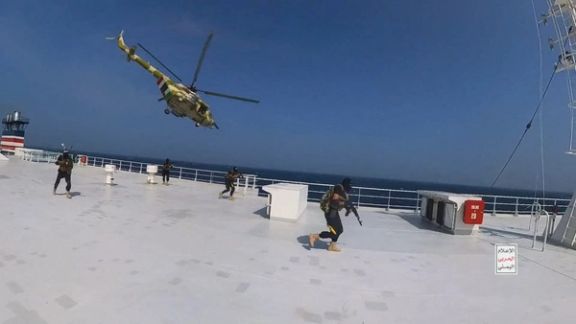
However, it is the Yemeni proxy, the Houthis, which has been the surprise factor, launching both long-range missiles towards Israel and stepping up activities in the Red Sea.
The US was clear in its support of Israel’s right to defend itself in the wake of the single most deadly day for Jews since the Holocaust but as the death toll mounts and Gaza’s destruction continues as Israel vows to wipe out Hamas, both the US and Israel have become the new target of Houthi terror.
A container ship managed by an Israeli-controlled company was hit by a suspected Iranian drone in the Indian Ocean, causing minor damage to the vessel but no injuries, a US defence official said on Saturday.
Earlier this month, the Galaxy Leader was taken to a Yemeni port after the proxy group believed it was owned by an Israeli businessman, though the vessel was operated by Tokyo-based firm Nippon Yusen.
At the time, Israeli PM Benjamin Netanyahu was quick to point the finger at Iran. “This is another Iranian act of terrorism that represents an escalation in Iran’s belligerence against the citizens of the free world, with concomitant international ramifications vis-a-vis the security of global shipping routes,” his office said.
The Southern Transitional Council condemned the “acts of terrorist piracy and calls on the international community to shoulder the grave responsibility of confronting and deterring these threats with the utmost resolve. Houthi actions and persistent terrorist behavior continue to obstruct all peace efforts in the South and Yemen, as well as at the regional level”.
It has reignited the fierce debate over the US redesigning the Houthis, the Biden administration removing the label amidst the humanitarian crisis resulting from years of civil war in Yemen.
It is being weighed at the top levels. “In light of the recent targeting of civilians by the Houthis, and now the piracy of a ship in international waters, we have begun a review of potential terrorist designations, and we’ll be considering other options together with our allies and partners,” National Security Council spokesman John Kirby said.
Experts agree. “A redesignation of the Iran-supported Houthi organization Ansar Allah [Houthis] is long overdue,” said Matt Zweig, Senior Director of Policy for FDD Action, a US-based think tank.
“For far too long, they have threatened and attacked international shipping and US allies and partners in the region. To more effectively combat their sources of funding — including the regime in Iran — the United States should designate Ansar Allah as a specially designated global terrorist organization and a foreign terrorist organization.”
After last year’s attacks in Abu Dhabi, the United Arab Emirates has also been pushing the US to relist the Houthis. UAE and US air defenses prevented mass casualties during three attacks, though the strikes still killed three individuals and injured six.
“The UAE is urging the US to re-list the Houthis as a foreign terrorist organization under US law to disrupt their financial networks and foreign support while providing appropriate exceptions to ensure that humanitarian relief can continue unimpeded”, it wrote in an extensive report which noted the threats the group poses to the US as well as the region.

Religious prisoner Ayub Karimi was moved to solitary confinement last week in preparation for imminent execution in Ghezel-Hesar Prison in Karaj.
The prisoner, a SUnni Kurd, is the latest case rights groups fear will be victim to Iranian crackdowns on dissenting voices among the country's minorities.
According to Hengaw Organization for Human Rights, one week ago, the Kurdish religious prisoner, the father of two children, was taken to the solitary confinement wing.
It follows the execution on November 5 of fellow religious prisoner Ghasem Abesteh, one of Karimi's co-defendants.
Hengaw said that along with Karimi, five more religious prisoners have been identified as also facing imminent execution, Davoud Abdollahi, Farhad Salimi, Anwar Khezri, Khosrow Besharat, and Kamran Sheykha.
All of them were taken into custody in 2009 and were transferred to the detention center of the intelligence agency in Urmia (Orumiyeh) City.
They were tried in 2015, and subsequently sentenced to death. These sentences were confirmed by the Supreme Court in 2020, after years of legal battles. Despite a request for retrial in September 2020, the Supreme Court rejected their plea.
The charges against them include "War against God," "corruption on earth," "support for Salafi groups," and the alleged "murder" of Abdolrahim Tina, who was killed by unidentified assailants in September 2008. However, in letters published by human rights organizations in recent years, the accused individuals consistently denied any involvement in these accusations.
In July alone, Kurdistan Human Rights Network reported that in the past month, Iranian security forces detained at least 54 Kurdish activists and citizens in the western provinces of Iran. Two detainees were sent to prison while the fate of the rest, including two children, remains unknown.